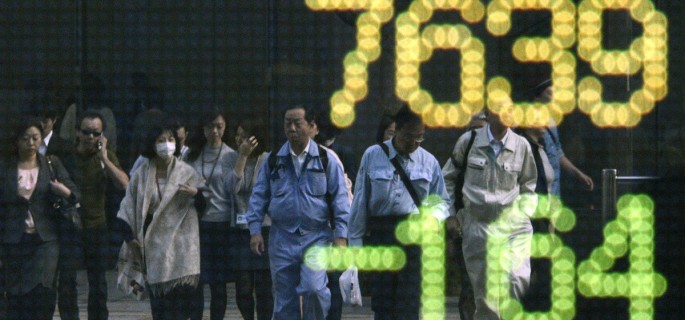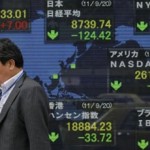Asia Stocks Fall After Rally, Aussie Dollar Drops: Markets Wrap

-
S&P 500 ekes out new record as VIX slumps to lowest since 1993
-
Japan’s Topix retreats from highest level since December 2015
Asian equity markets slipped from a two-year high in the absence of catalysts to spur further gains, while the Australian dollar slumped.
Investors are stepping back after a rally on Monday sent South Korea’s equities to a record and Japan’s Topix to the highest since December 2015. Chinese stocks fluctuated after losses that have erased more than $400 billion from equity values amid a crackdown on financial leverage. The Aussie fell to the lowest level since January after disappointing retail sales data.
“Markets have been struggling to make significant headway,” said Ric Spooner, chief market analyst in Sydney at CMC Markets Plc. “Full valuations have pre-empted a benign macro scenario of ongoing moderate growth, and markets appear to need good news to hold them around current valuations.”

Volatility is declining to multi-year lows in fixed-income and stock markets as labor-market strength and earnings continue to buoy global growth, while concerns over French elections have disappeared following Emmanuel Macron’s victory this week.
Investors will be parsing comments from Federal Reserve Bank of Minneapolis President Neel Kashkari later Tuesday for any clues on U.S. central bank policy. South Korean voters are going to the polls to elect their next president, while Australia’s Treasurer will deliver his budget Tuesday evening in Canberra at a time when the country’s top credit rating is said to be at risk.
Key events coming up this week:
- Earnings continue to be released with Walt Disney Co., Mitsubishi Corp., Toyota Motor Corp. and Deutsche Telekom AG among those notable.
- Voting is under way in South Korea to elect a new president following the ouster of Park Geun-hye in a corruption scandal.
- Australian Treasurer Scott Morrison will deliver his budget in Canberra. Economists predict a A$28 billion ($20.7 billion) budget deficit in the year through June 2018, about A$700 million less than the government forecast in its December update.
Here are the main moves in markets:
Stocks
- The MSCI Asia Pacific Index fell 0.4 percent as of 12:50 p.m. in Tokyo. The gauge closed Monday at the highest level since June 2015.
- Japan’s Topix index fell 0.3 percent after jumping 2.3 percent in the previous session, its biggest one-day gain since January.
- The Shanghai Composite Index was little changed after a selloff brought the gauge to the lowest level since October.
- Hong Kong’s Hang Seng rose 0.4 percent, while Taiwan’s Taiex Index was little changed after erasing an earlier advance. South Korea’s market is closed on election day.
- Australia’s S&P/ASX 200 Index dropped 0.4 percent after weaker-than-expected earnings at Commonwealth Bank of Australia dragged financial shares lower.
- Futures on the S&P 500 slipped less than 0.1 percent after the underlying gauge rose less than one point to a record Monday. The VIX index, a gauge of volatility in the U.S. equity market, tumbled to the lowest level since 1993.
Currencies
- The Australian dollar dropped 0.4 percent to the lowest since Jan. 11 as retail sales data further weakened the outlook for the nation battling a slump in prices of iron ore.
- The Bloomberg Dollar Spot Index was steady, while the yen was flat at 113.24 per dollar.
- The euro traded at $1.0930, up less than 0.1 percent. The currency fell 0.7 percent Monday following Macron’s victory as France’s next president, after trading at the highest level since November.
Bonds
- The yield on 10-year Treasury notes slipped one basis point to 2.38 percent, after climbing four basis points on Monday.
- Yields on Australian government debt with a similar maturity rose one basis point to 2.69 percent.
Commodities
- Gold gained 0.2 percent to $1,228.36 an ounce, halting a four-day decline.
- Oil was little changed at $46.44 a barrel after a two-day advance, as investors awaited government data on U.S. crude supplies.
- Iron ore futures fell 0.4 percent as concern builds about the outlook for rising supply and China’s clampdown on leverage.
Source: Bloomberg



























